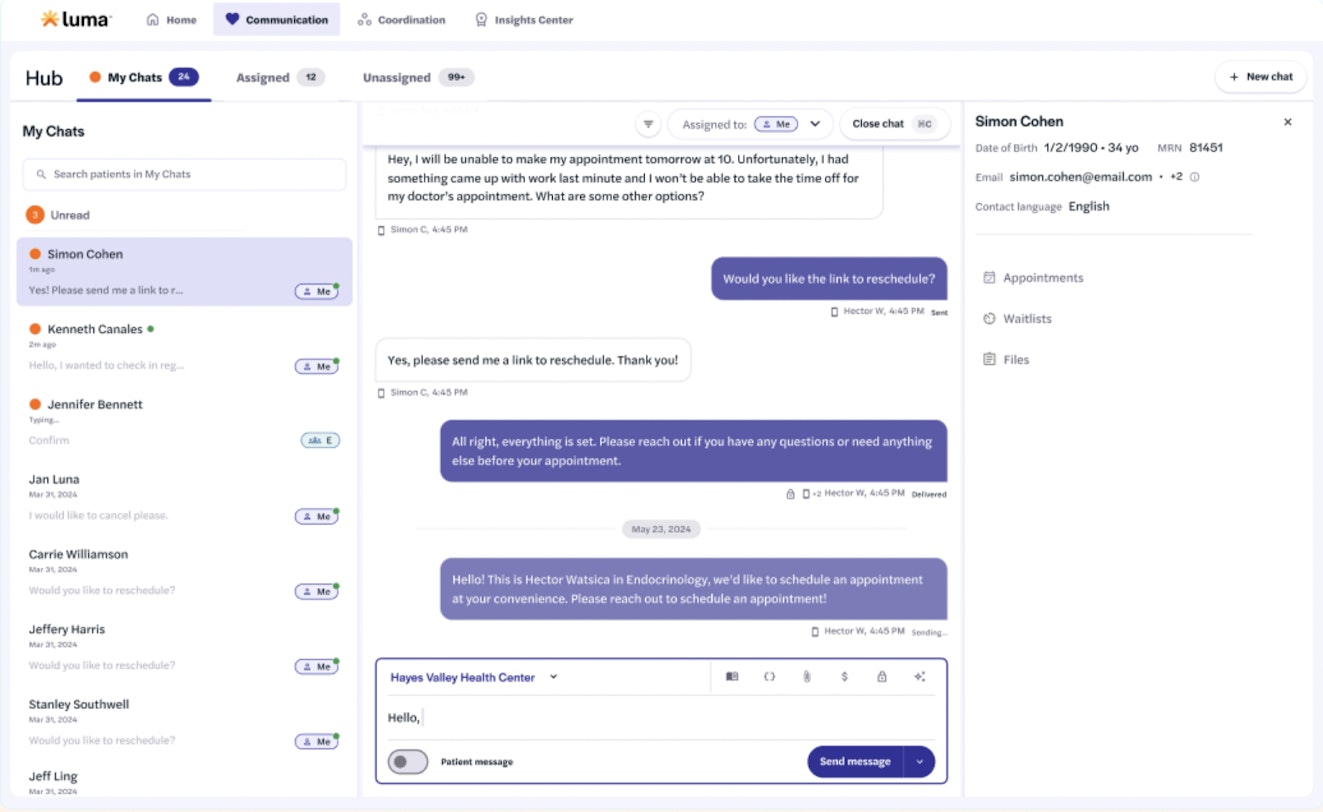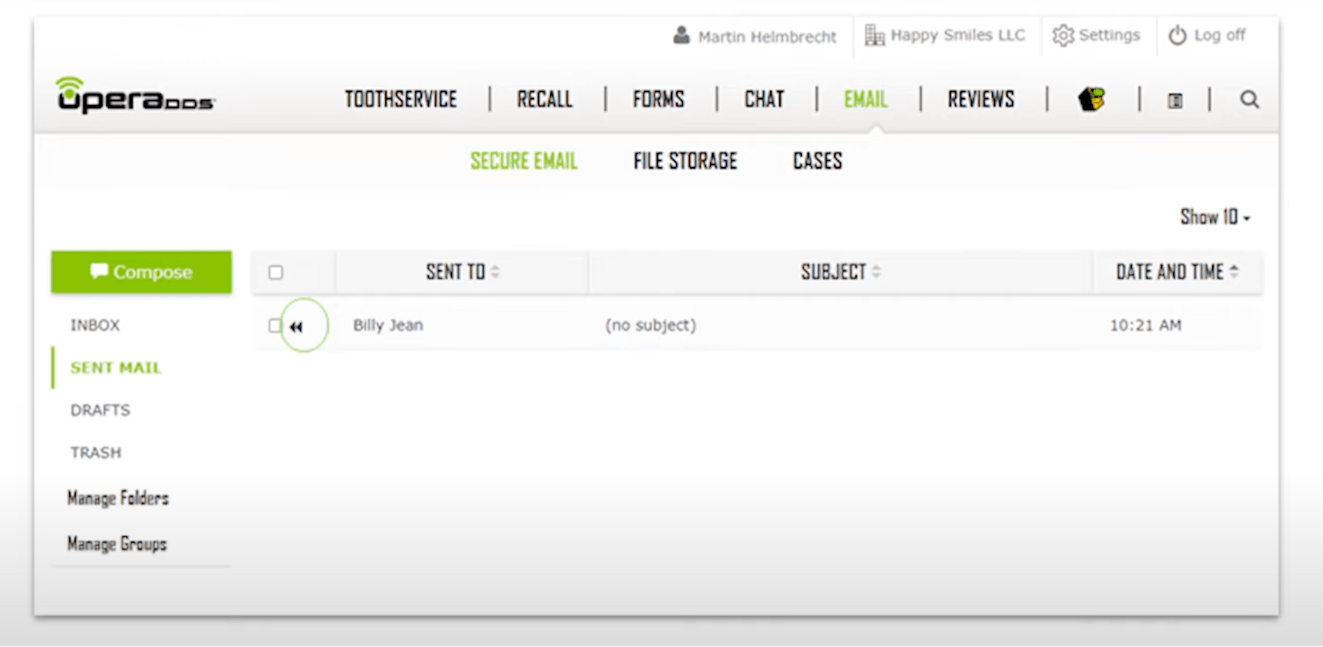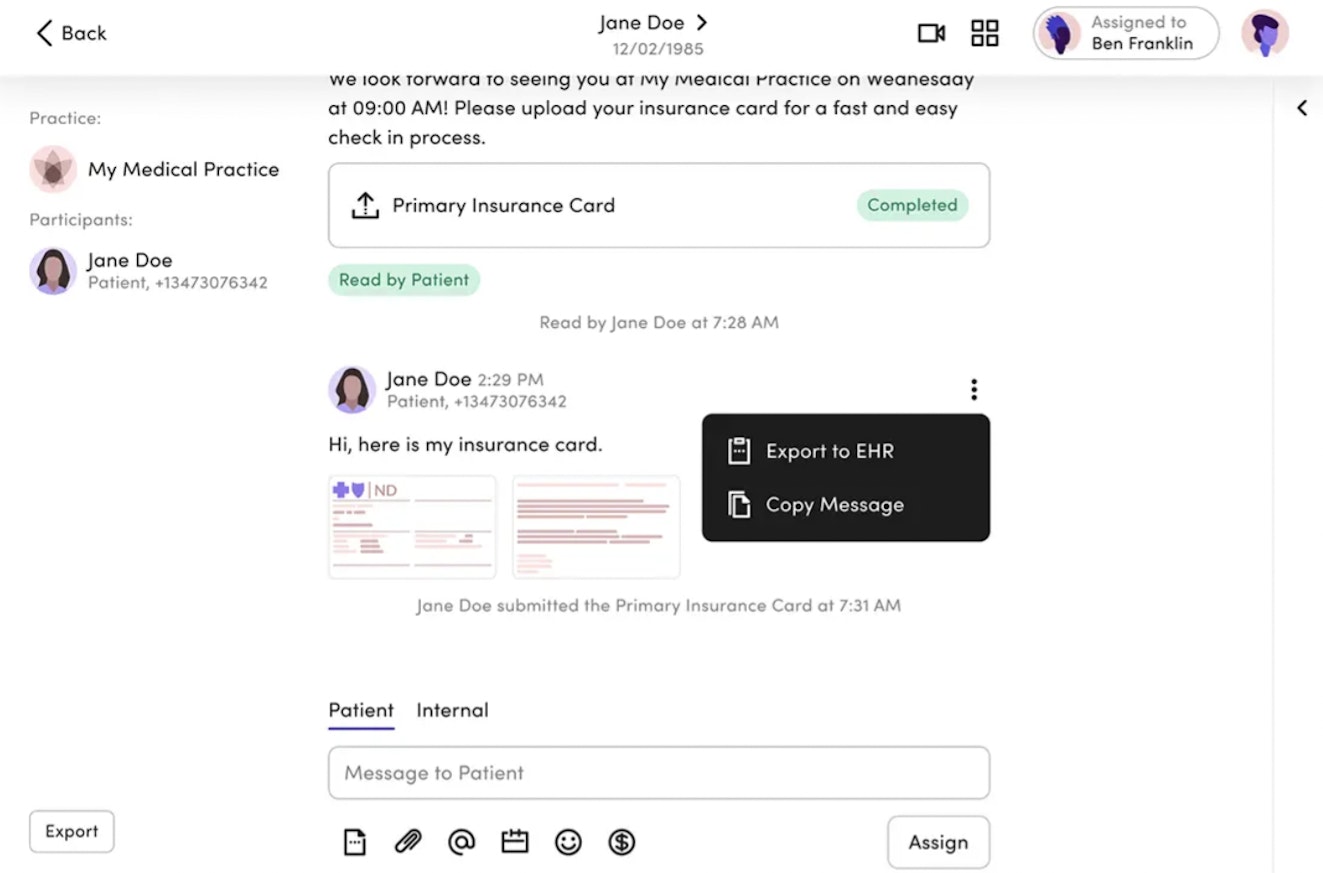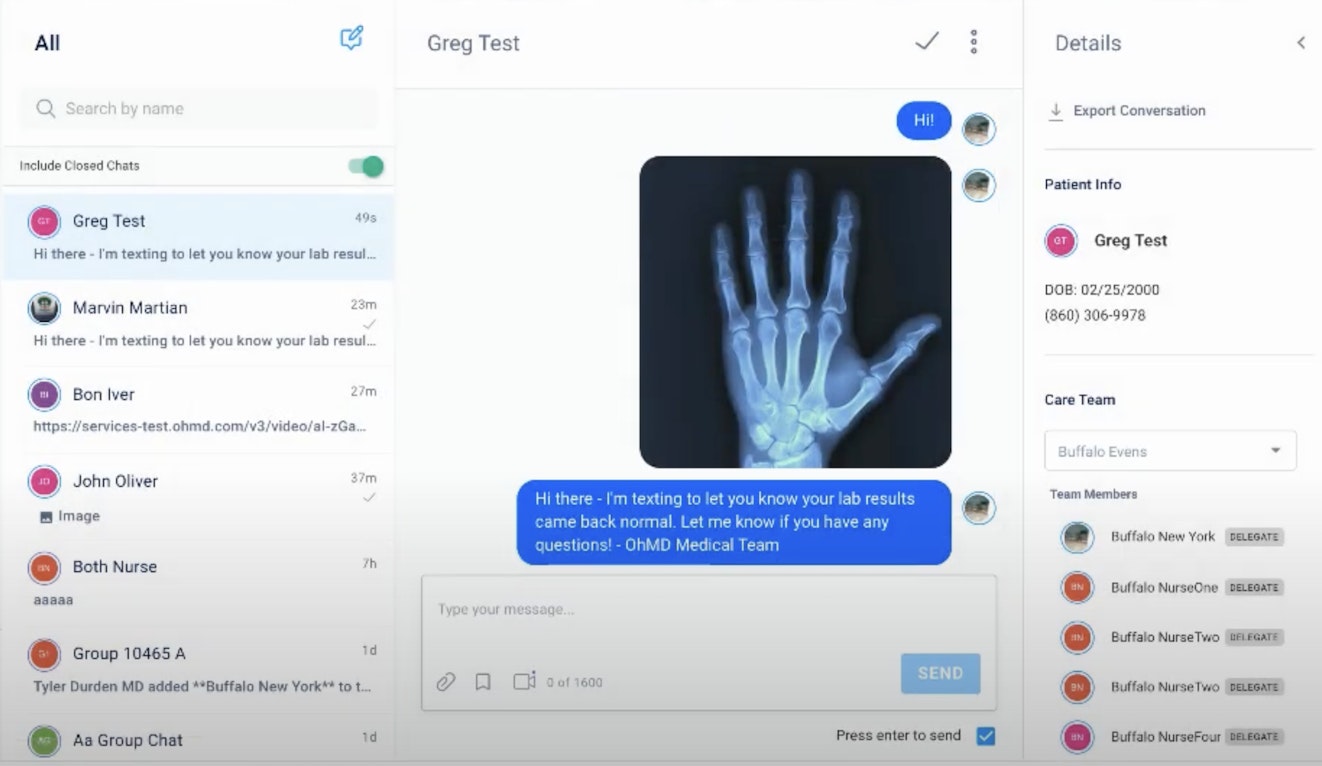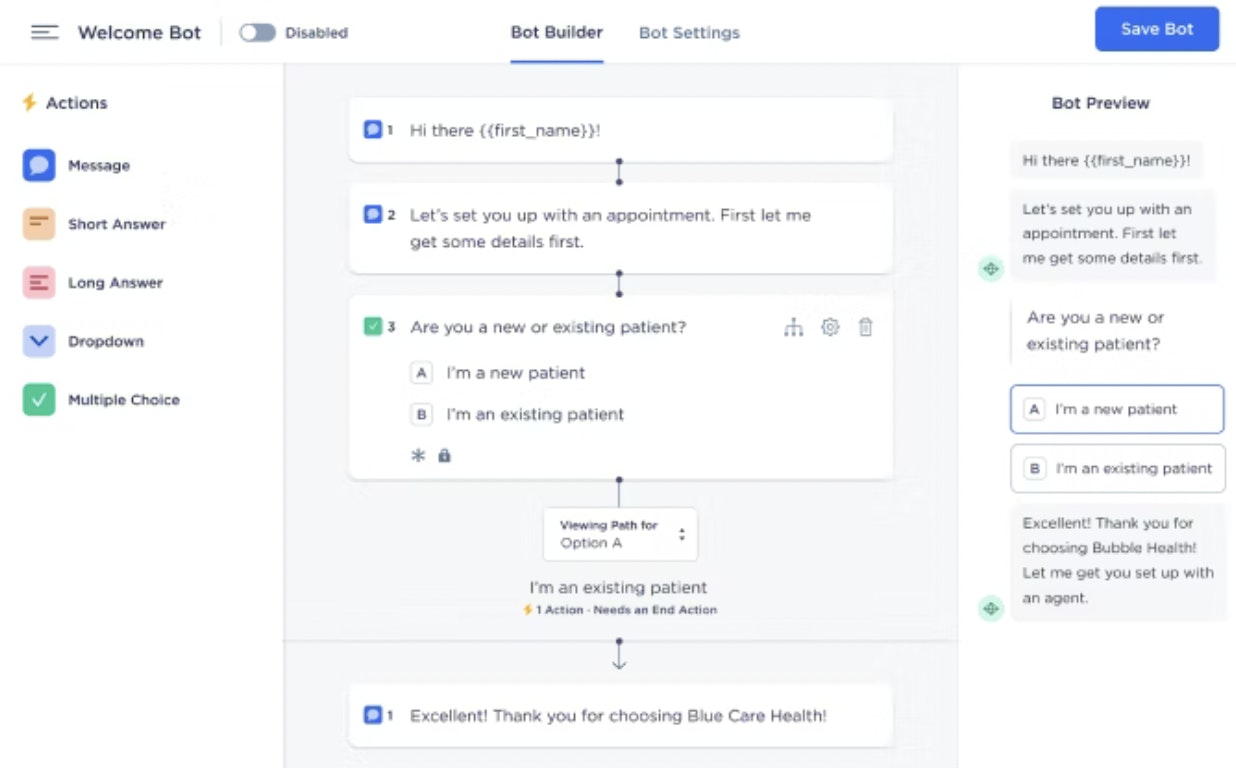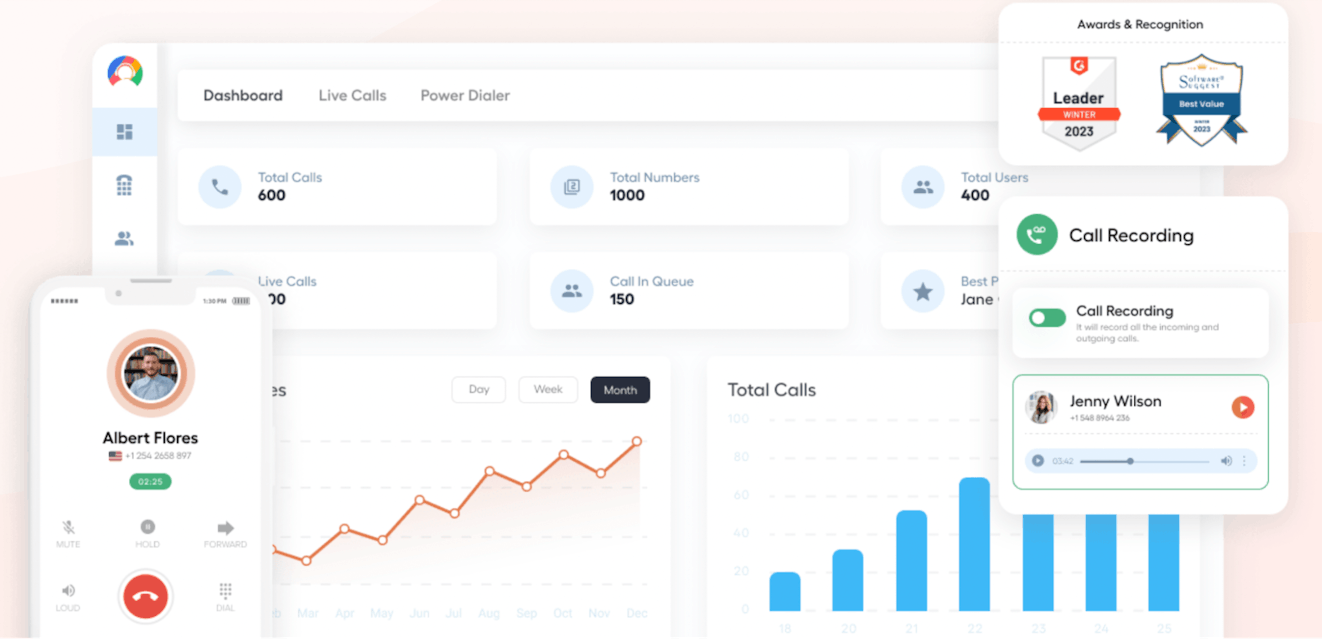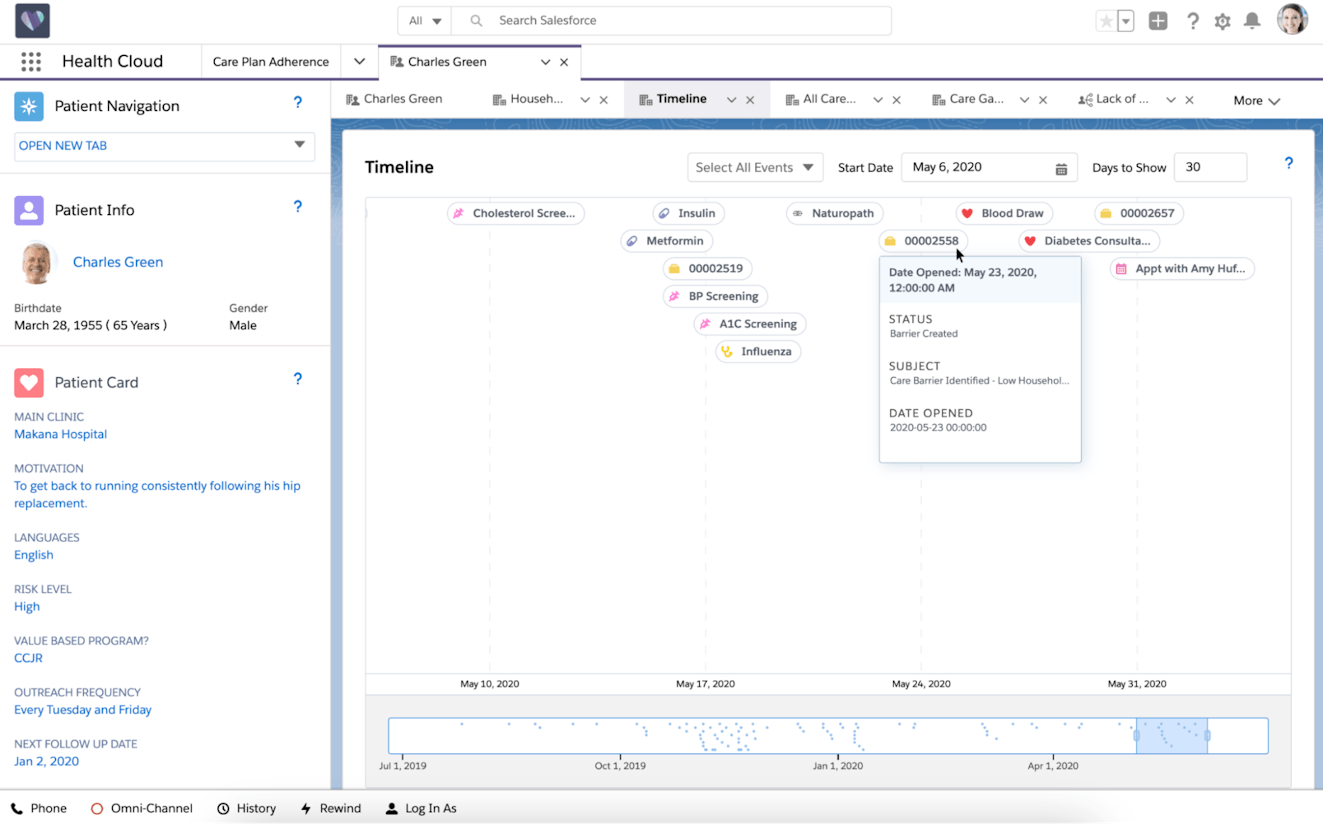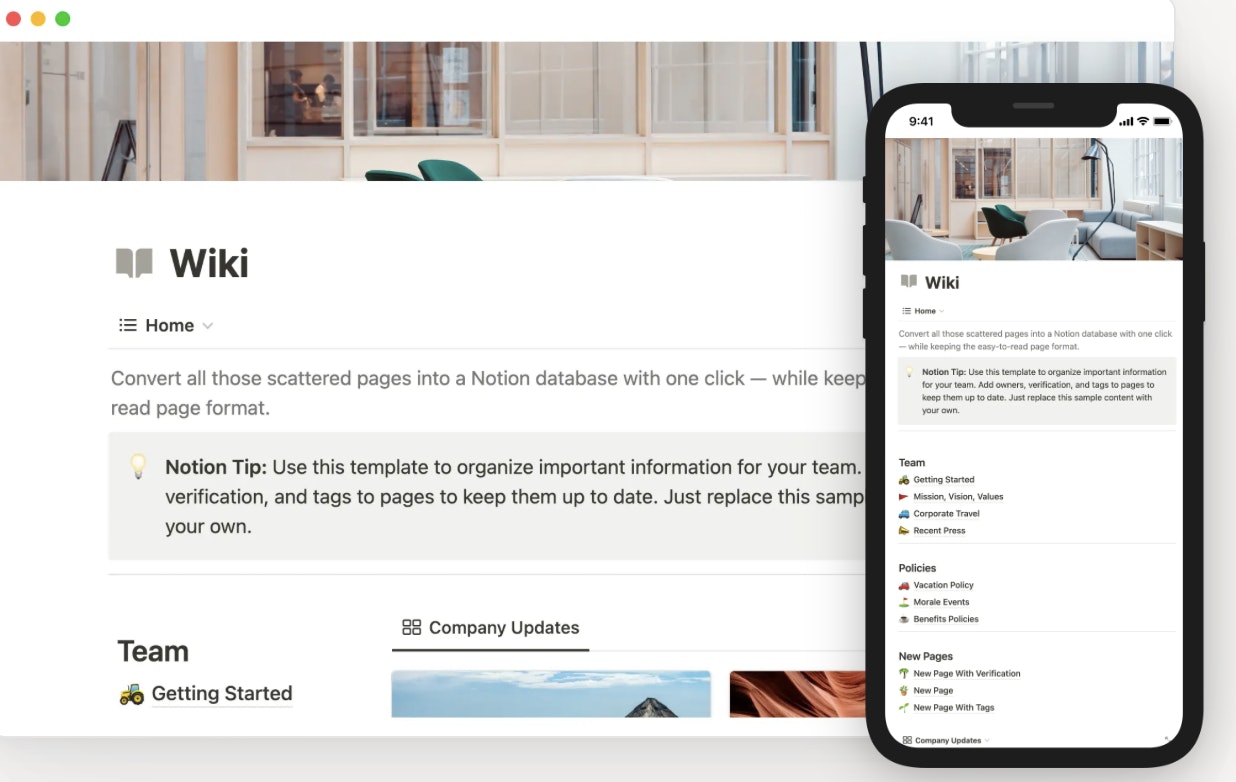Though patients may not traditionally be seen as “customers,” their expectations for service are just as high — if not higher — than in any other industry. Yet an analysis of 35,000 online reviews showed that 96% of patient complaints stem from poor customer service.
In a patient-driven market, poor service is a fast track to losing them. Why would someone come back when another facility offers the warmth and efficiency they’re looking for?
Here’s the silver lining: What may seem like a challenge is actually a huge opportunity. Studies show that healthcare facilities prioritizing exceptional patient experiences can achieve 50% higher margins than their peers. The key? Investing in service quality and equipping your customer care team with the right tools to deliver it.
In this article, we’ll explore the nine best healthcare customer service software that can help you meet patient expectations, retain their loyalty, and ultimately drive better outcomes for your organization.
The 9 best healthcare customer service software
Here’s a handpicked list of the nine best healthcare customer service software that will help you elevate your patient experience and streamline customer care operations.
1. Help Scout – Best for growing healthcare companies
Help Scout is a help desk platform ideal for growing healthcare businesses. It offers a modern interface and secure interactions with configurable HIPAA compliance across most features, including live chat, a shared inbox, and proactive messaging.
Plus, Help Scout’s 24/6 customer service team offers top-notch support, so you’ll always have the tools you need to deliver superior patient care.
Shared inbox for managing patient requests
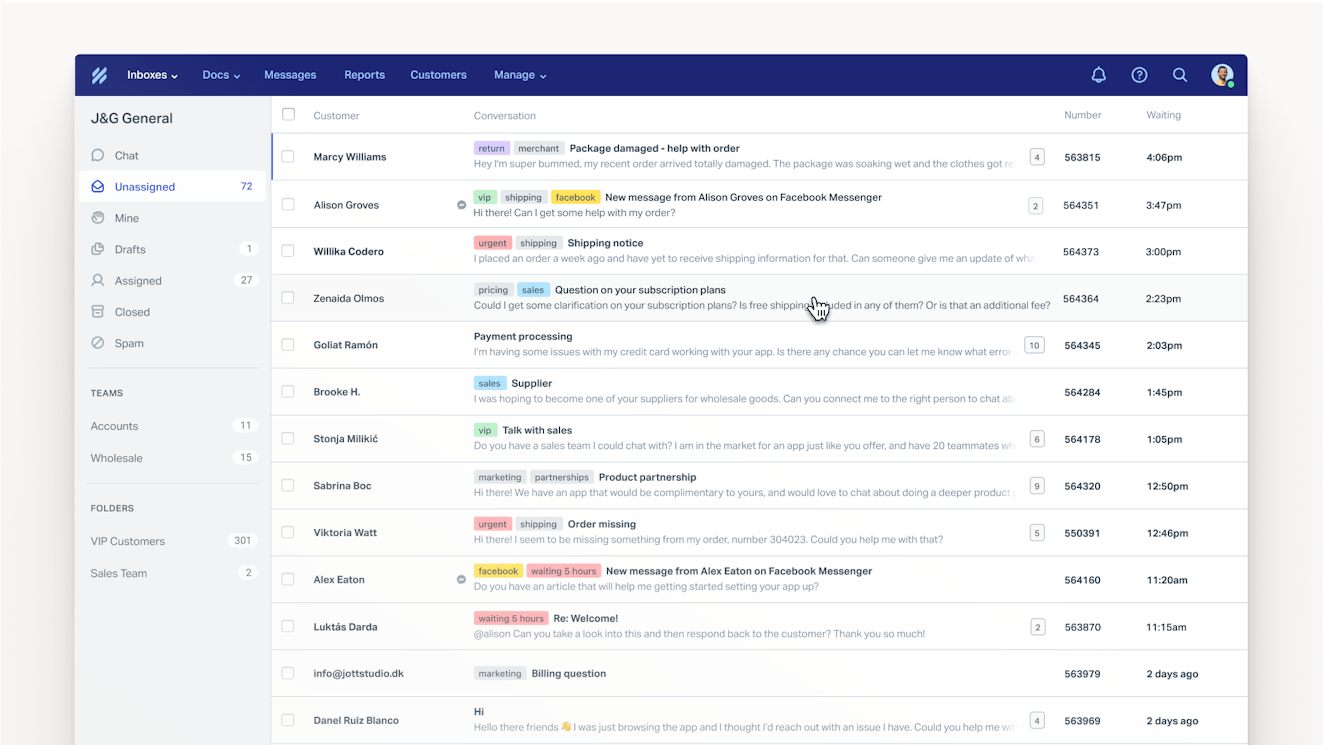
Help Scout’s shared inbox centralizes email and chat conversations, enabling healthcare teams to manage patient requests with:
Collaboration tools. Tag messages, use internal notes, and assign conversations to team members to ensure smooth collaboration.
Efficiency features. Collision detection prevents duplicate responses, while saved replies simplify handling repetitive questions. You can also create conversation views to keep track of similar issues or group requests by team.
Patient context. Patient information is surfaced directly in the conversation sidebar to deliver personalized and contextual responses.
Live chat
Beacon, Help Scout’s live chat widget, is easy to install and is included in every plan. Use it to support customers in real time or provide easy access to knowledge base articles via AI-generated answers to simple questions like queries about parking or facility locations.
AI and automation
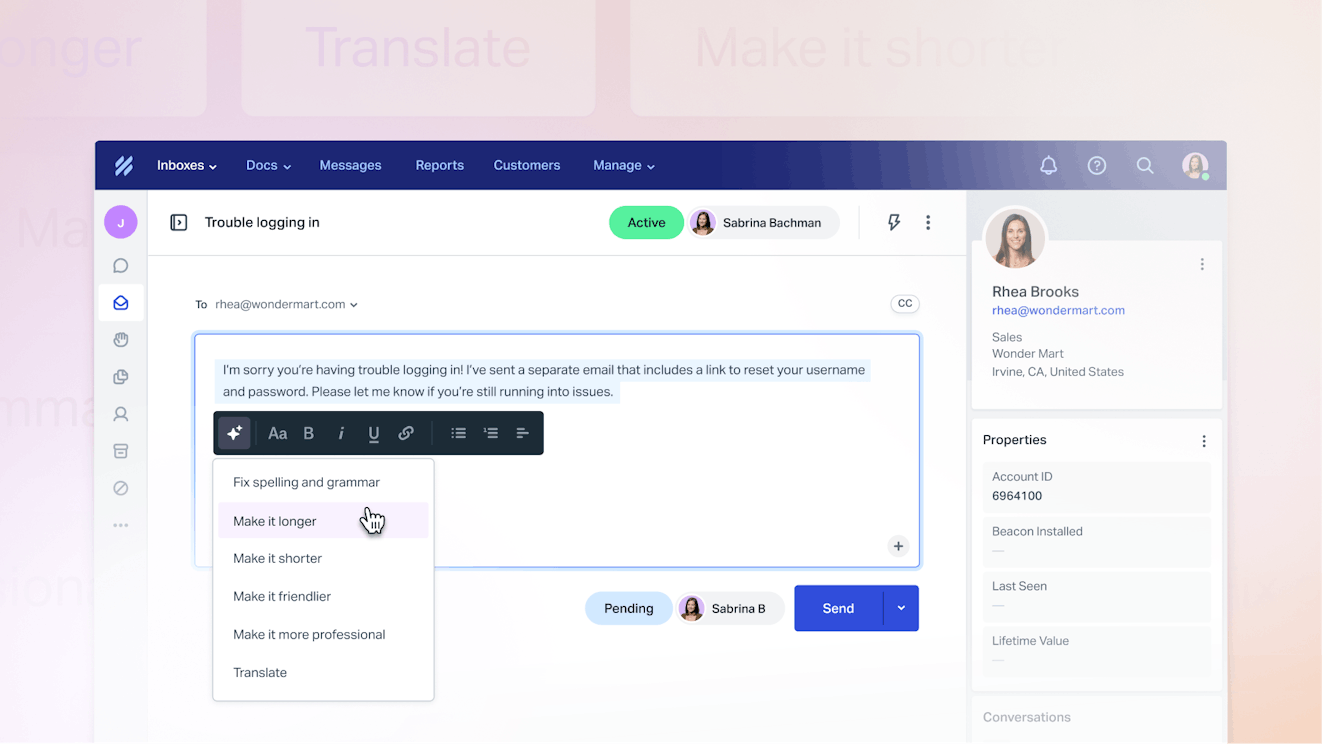
Help Scout offers powerful automation and AI features to maximize agent efficiency and save time:
Create workflows to automate repetitive tasks, like tagging or assigning conversations.
Use AI Summarize to quickly generate bulleted summaries of long email threads, which are helpful for smooth escalations or future reference.
Polish and translate replies with AI Assist — you can check spelling, adjust tone or length, or translate replies into different languages.
Generate drafts based on prior conversations and your help center articles – enabling agents to craft quality replies in seconds.
Enable self-service with AI Answers and provide instant responses to common questions through the live chat (Beacon). If your customer service team is working to support offices across multiple time zones, but you don’t have resources for 24/7 support, Answers will enable patients to get the help they need when they need it.
Proactive communication and notifications
Beyond the help desk functionality, Help Scout enables you to stay ahead with tools to engage and inform your patients, including:
Messages to share announcements or proactive support updates, notifying patients about a change in parking arrangements or office closures due to weather conditions.
Microsurveys to collect actionable feedback with targeted, HIPAA-compliant forms.
Docs to publish a knowledge base and empower patients to find answers independently.
Comprehensive reporting
Monitor your team’s performance and patient engagement with Help Scout’s reporting dashboards, allowing you to:
Track chat and email volume, response times, team productivity, and trends.
Gain insights into emerging patient issues with tag reports to improve your care and processes.
Integrations
Help Scout integrates with over 90 platforms — from marketing solutions to CRMs — and offers an open API for custom solutions. For example, you can integrate Help Scout with JustCall, a HIPAA-compliant cloud phone call solution to provide phone support directly from Help Scout’s interface.
A note about HIPAA compliance in Help Scout:
While most of Help Scout’s features can be configured to be HIPAA compliant, integrations between Help Scout and other platforms may not meet HIPAA standards. In addition, Help Scout’s knowledge base solution, Docs, is not considered to be compliant.
Compliance
Help Scout can be configured to be HIPAA compliant, ensuring the secure processing and storage of protected health information (PHI). For more information on HIPAA compliance and security at Help Scout, visit:
Learn more about Help Scout:
2. Luma Heath – Best for established healthcare organizations
Luma Health brands itself as the world’s first Patient Success Platform, designed to streamline the patient journey while optimizing operational workflows for healthcare organizations. They offer out-of-the-box solutions that can be customized to meet the needs of established healthcare facilities.
Luma’s focus on bi-directional EHR integrations, AI-powered automation, and patient-centric features make it a solid option for organizations looking to enhance both patient care and operational efficiency.
Key features
Bi-directional integration with leading EHR systems: This includes Oracle Health, Meditech, and athenahealth, as well as payment, CRM, and call center platforms widely used in healthcare.
Shared inbox: Pulling information from your EHR system, Luma provides access to patient demographics and appointment details without having to switch tabs. Everything from updating patient information and booking appointments to enrolling patients in waitlists can be done directly from the conversation view. You can also collaborate with teammates by tagging them, setting up templates with variables for quicker messaging, and sending forms and attachments directly within the conversation view.
AI automation: Spark, Luma’s HIPAA-compliant AI automation, enables self-service and offers real-time translation for patient messages when human intervention is required.
Self-service powered by conversational AI: Luma empowers patients to take control of their scheduling, enabling them to self-schedule appointments via SMS, your website, or Google; join waitlists for open slots, which are filled automatically without manual intervention; and reschedule or cancel appointments directly through SMS, reducing call volume and freeing up your staff resources.
Automated intake and patient forms: Luma automates pre-appointment workflows by sending personalized forms (e.g., HIPAA consents, clinical questionnaires) before the visit and allowing patients to upload insurance information from home. At the same time, your staff gets a checklist for each patient tailored to the appointment type (like pre-colonoscopy prep) to verify insurance and eligibility and ensure that everything is ready before the visit.
Unlimited automatic reminders and no-show follow-ups: Automate manual work and reduce missed appointments through reminders that can be sent in 30+ languages. They are powered by conversational AI, enabling patients to respond naturally — for example, with a quick text like “Sorry, I won’t be able to make it 😿” to cancel an appointment. This minimizes the need for outbound phone calls without compromising the patient experience.
Compliance and certificates
HIPAA compliant.
SOC 2 Type II attestation.
ISO 27001:2022, TX-RAMP Level 2, and HITRUST CSF certifications
US-EU Privacy Framework participant (including UK and Swiss extensions).
3. OperaDDS – Best for dental practices
OperaDDS is a comprehensive patient communication tool designed specifically for dental offices. Whether you’re managing a small office or a large clinic, OperaDDS offers features to improve internal communication, streamline patient interactions, and optimize workflows.
OperaDDS comes with dental-specific features like paperless intake forms and secure support for sending and storing sensitive patient information, such as X-rays or treatment plans. It also has features typical for medical customer service tools, including secure communication channels and automated patient reminders.
Key features
Secure email: Dental practices deal with sensitive patient information, such as X-rays and treatment plans, which require robust security. OperaDDS offers a HIPAA-compliant, secure email solution that keeps patient data safe. Additionally, with OperaDDS Secure Email, you can retract messages before they are read — avoiding costly HIPAA violations and embarrassing mistakes.
Secure case collaboration tools: OperaDDS makes it easy for staff to communicate securely and efficiently, regardless of device. With its HIPAA-compliant messaging system, teams can access notes from previous visits to avoid repetitive questions and discuss cases quickly without hunting down colleagues.
Digital forms for streamlined intakes: The app comes with HIPAA-compliant digital forms that simplify the patient intake process, reduce paperwork, and minimize data entry errors. Thanks to integration with Open Dental, patient records are automatically updated as soon as forms are completed.
Automated appointment reminders: OperaDDS helps reduce no-shows with automated reminders via text messages, emails, and voice calls. Cancelled appointments can be quickly rescheduled from the OperaDDS dashboard.
Keep in mind that reporting capabilities in OperaDDS are quite basic and may not meet the needs of larger or more data-driven practices.
Compliance
HIPAA compliant.
4. Klara – Best for streamlining the patient journey
Klara is a patient engagement platform designed to simplify communication between medical practices and their patients. It allows providers to connect with patients via voice, web chat, or text messaging. Klara’s call-to-text functionality enables patients to seamlessly shift from a phone call to a text message, cutting down on hold times and enhancing their experience.
Key features
Shared inbox: Klara consolidates all patient communication — calls, text messages, web chats, and voicemails (transcribed and logged as tickets) — into one centralized queue so your team can manage interactions across multiple channels while keeping patient information organized. Incoming messages can be automatically routed to the appropriate team or manually assigned to staff members.
EHR integrations: Klara integrates with major EHR systems, including athenahealth, Veradigm (formerly Allscripts), AdvancedMD, Greenway, and many others. With just one click, staff can export relevant patient messages directly into the EHR, eliminating the need for manual data entry.
Self-service scheduling features: It supports 24/7 online patient self-scheduling, reducing the volume of incoming calls and ensuring your schedules remain full.
Digital intake forms: Patients can complete pre-visit paperwork and upload their insurance information at their convenience ahead of their appointment.
Customizable appointment notifications: With Klara, you can go beyond generic reminders with personalized messages that reduce no-shows by including specific details like your clinic’s address, parking instructions, or other appointment-related information. Klara also automates no-show follow-ups with rescheduling invitations and has the option to send pre-visit instructions or post-visit follow-ups tailored to the type of appointment.
Compliance
HIPAA compliant.
5. OhMD – Best for SMS and live chat support
OhMD is a HIPAA-compliant texting and telehealth platform designed to simplify communication between healthcare providers and patients using automations. Known for its ease of use, it’s ideal for healthcare organizations that want to reduce administrative burdens while improving patient engagement.
From live chat to appointment scheduling and prescription refills, OhMD’s toolkit automates routine tasks, freeing up your team to focus on more meaningful interactions. With integrations across more than 80 EHR platforms, it’s adaptable for practices of all sizes, from small clinics to large hospitals.
Key features
Secure live chat and two-way SMS: OhMD enables healthcare organizations to add a live chat widget to their websites, giving patients an easy, secure way to communicate with your practice. For even more flexibility, OhMD supports HIPAA-compliant two-way SMS, requiring no app downloads or patient portal logins. You can send and receive intake forms, surveys, and files over SMS texts or through encrypted messages.
Shared inbox for team collaboration: Administrative staff and providers can manage patient communications from a shared inbox. You can create saved replies, leave internal notes, and send data directly to your EHR system with just one click.
Two-way integrations with 80+ EHR systems: These allow you to easily search for any patient directly within OhMD without having to manually add them and send notes back to patient records automatically, eliminating the need for copy and paste.
OhMD’s AI-driven Autopilot: Autopilot streamlines repetitive workflows such as appointment scheduling, reminders, prescription refills, and patient referrals. While patients engage with Autopilot’s automated questions, your team can jump into the same conversation with full context, ensuring a truly personalized and efficient patient experience.
One thing to keep in mind when considering OhMD for your team is that some users have reported occasional login timeouts, which could lead to lost drafts.
Compliance
OhMD meets strict security standards, with HiTrust Assessment ensuring compliance with HIPAA and NIST requirements.
6. Medchat – Best for organizations interested in automation
MedChat is a HIPAA-compliant live chat platform for healthcare organizations. It focuses on automating workflows, streamlining patient interactions, and empowering customer service teams with AI-powered tools.
Whether you’re a small clinic or a large healthcare facility, MedChat helps reduce patient wait times, improve engagement, and deflect cases that don’t require human intervention.
With its intuitive visual builder (and low-code environment for advanced automations), MedChat makes it easy to create chatbots and automate routine tasks so your team can focus on what matters most — providing excellent patient care.
Key features
Triage bots for automated symptom evaluation: MedChat’s triage bots allow healthcare providers to assess patients’ symptoms and offer care suggestions in real time. By collecting detailed information upfront, these bots save time for medical staff while ensuring patients get quick and accurate guidance.
AI-powered live chat workflows: Workflows help automate scheduling and rescheduling appointments, collect patient details, and guide patients through pre-appointment checklists. These workflows are intuitive to set up and can handle multilingual communication, automatically translating messages into over 30 languages. Patients can access live chat through secure links sent via SMS, email, or even phone call prompts, allowing them to resolve issues quickly without waiting in line.
Custom integrations: MedChat integrates with major EHR and CRM platforms, including athenahealth. Their team also claims they can integrate with virtually any tool your organization uses, so custom setups are possible if your budget allows.
Comprehensive reporting: MedChat offers detailed analytics to help you track and optimize live chat performance. Key metrics include the number of patients waiting to connect with an agent, the most common topics and questions, chat volume, average chat duration, and agent response times.
Compliance
HIPAA and SOC 2 Type II compliant.
7. CallHippo – Best for medical call centers
CallHippo is a powerful VoIP phone system designed to bring flexibility and efficiency to medical call centers. While it’s not exclusively built for the healthcare sector, its HIPAA compliance and emphasis on secure communications make it a reliable choice for medical customer service teams. Whether you’re managing calls for a small clinic or a large hospital network, CallHippo offers the tools to streamline your operations and enhance the patient experience.
Key features
Interactive voice response (IVR): This enables automated call triaging, guiding patients through an intuitive menu to direct their calls to the appropriate department or medical team based on their needs. Whether a patient has a billing question, needs prescription assistance, or is seeking emergency care, the IVR ensures they’re connected quickly and efficiently.
Call queueing and forwarding: To handle high call volumes, CallHippo supports call queueing and smart call forwarding. This ensures that no patient is left waiting unnecessarily and that calls are directed to available agents or specialists who can provide the necessary support.
Call recording and transcription: For compliance, quality assurance, and training purposes, CallHippo offers call recording and securely stored high-quality transcriptions. This allows you to go back and review past conversations, identify areas for improvement, and ensure that every patient interaction meets the highest standards of care.
Compliance
HIPAA and SOC 2 Type II compliant.
8. Salesforce Health Cloud – Best for tracking customer relationships
Salesforce Health Cloud is a robust, connected CRM for healthcare designed to help organizations centralize and streamline their patient management processes. It integrates clinical and non-clinical data into a single source of truth, enabling providers to make better decisions, coordinate care, and deliver a seamless patient experience.
While Salesforce Health Cloud’s user interface may require a learning curve, it’s still a popular choice for businesses due to the extensive feature set, strong security measures, and scalability. Beyond healthcare, Health Cloud healthcare CRM connects with Salesforce’s broader platform, including tools for automation, marketing, sales, and business analytics.
Key features
Centralized patient profiles: Health Cloud provides a holistic view of each patient by combining clinical and non-clinical factors such as medical history, demographics, claims, social determinants, and behavioral data into one real-time profile. Features like the Household View allow you to link all members of a patient’s family under a single plan, assigning roles like primary or secondary caregiver.
Appointment management: The platform simplifies scheduling with agent-assisted booking, waitlisting, and multi-participant appointments for group care.
Workflow automation: Engage patients with timely and personalized workflows, including appointment reminders, follow-up emails, and care plan updates. Automating these communications ensures that patients stay informed and engaged while reducing manual effort for your team.
Integrations: Salesforce Health Cloud integrates with leading EHR systems and other technologies in your existing tech stack, enabling you to build a well-rounded patient care ecosystem. However, to unlock its full potential, organizations may require several custom integrations.
Compliance
Meets HIPAA, HL7 FHIR, and HITRUST requirements.
9. Notion – Best for internal knowledge base management
Managing internal knowledge in healthcare can be tricky. Whether it’s documenting policies for patient intake or creating guidelines for insurance verification and billing, your team needs an organized, secure space to store and access this information.
Sure, you could keep it all in a shared Google Drive folder, but as that folder grows to dozens (or even hundreds) of documents, finding the right information becomes a nightmare.
Over the years, I’ve tried various solutions — Google Docs, custom wikis built on WordPress, and even specialized tools like Guru. After all of this, Notion stands out as one of the best tools for managing internal knowledge. Notion workspaces can be set up in a HIPAA compliant way, making it a great fit for healthcare orgs.
Key features
Create sections and subsections with granular control over permissions. Whether it’s policies for handling PHI, checklists for regulatory audits, or on-call schedules, your team can organize it all in one centralized place.
Track page views, monitor edit history, and control access on a user or team basis. This is especially useful when dealing with sensitive healthcare data.
Organize content. As your organization grows, your internal knowledge base can grow with it — Notion’s drag-and-drop content blocks make reorganizing and expanding your knowledge base a breeze.
Compliance
HIPAA compliance is only available on Notion’s Enterprise plan.
Features to look for in healthcare customer service software
The customer service software market is overflowing with options. But if you’re managing customer service for a medical business, most of those options won’t work for you.
Healthcare’s software requirements are unique, like strict privacy and data security standards, integrations with patient information platforms, appointment scheduling capabilities, etc.
How do you navigate the sea of options and find the right fit?
Here are the essential features to look for when choosing medical customer service software for your team.
Data security and compliance
Security is non-negotiable, especially when handling sensitive patient health information. While GDPR and CCPA compliance, secure data transfer protocols, and encryption are standard across industries, healthcare organizations must go further. Look for tools that are either HIPAA-compliant out of the box or can be configured to meet HIPAA requirements.
A good idea is to loop in your security team early in the procurement process to ensure the software meets your organization’s standards — skipping this step could lead to compliance headaches down the line.
Omnichannel support
In healthcare, customer service goes beyond emails and live chat. Patients often reach out via phone and SMS texts as well, so ensure the software you choose supports all the channels your team uses to communicate with patients.
Automation features are also important here — nobody enjoys repetitive tasks like manually entering data, sending appointment reminders, or chasing schedules. Look for tools that allow you to automate routine processes, such as sending reminders, updating patient records, or escalating issues.
Keep in mind that while AI-powered automations are gaining traction, not all tools offering these features are HIPAA compliant. Double check before adopting AI solutions to ensure they align with your organization’s compliance needs.
Integrations
Switching between tabs and systems is a huge productivity drain for customer service teams. To streamline workflows, look for tools that integrate seamlessly with your existing systems — especially electronic health record (EHR) platforms, scheduling tools, and communication apps.
The goal is to create a cohesive tech stack where tools “talk” to each other, minimizing friction and enabling your team to work efficiently.
Reports and analytics
In healthcare, intuition can only take you so far. Hard data is critical for identifying areas for improvement. Choose software that offers robust reporting and analytics capabilities, allowing you to monitor key performance indicators (KPIs) such as:
Response and resolution times.
Ticket volume and distribution by channel, agent, or issue type.
Agent productivity.
Appointment bookings and errors.
Complaint trends.
Having access to actionable insights will empower your team to optimize their workflows and improve patient satisfaction in the long run.
Pricing structure
Pricing for medical customer service software can either be a flat monthly fee or vary based on factors such as the number of agents or ticket, call, or appointment volume. To choose the most cost-effective model, consider your team’s needs:
Do you have a few agents or employees handling a high workload? User-based pricing might be best.
Are you working with a large team but a smaller number of premium patients? Patient-based pricing could be a better fit.
Do your needs fluctuate frequently? A flat subscription fee might offer better cost predictability.
And finally, make sure to factor in scalability — your needs today might not reflect your needs a year from now.



